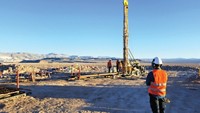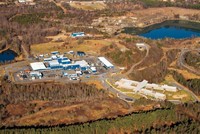Advertisement
Grab your lab coat. Let's get started
Welcome!
Welcome!
Create an account below to get 6 C&EN articles per month, receive newsletters and more - all free.
It seems this is your first time logging in online. Please enter the following information to continue.
As an ACS member you automatically get access to this site. All we need is few more details to create your reading experience.
Not you? Sign in with a different account.
Not you? Sign in with a different account.
ERROR 1
ERROR 1
ERROR 2
ERROR 2
ERROR 2
ERROR 2
ERROR 2
Password and Confirm password must match.
If you have an ACS member number, please enter it here so we can link this account to your membership. (optional)
ERROR 2
ACS values your privacy. By submitting your information, you are gaining access to C&EN and subscribing to our weekly newsletter. We use the information you provide to make your reading experience better, and we will never sell your data to third party members.
Business
Albemarle To Make Lithium
New Technology: Company claims advance will allow recovery of lithium from Arkansas brine
by Marc S. Reisch
May 9, 2011
| A version of this story appeared in
Volume 89, Issue 19

Seeing an opportunity to participate in the developing market for batteries to power electric vehicles, Albemarle has developed technology that it says can recover lithium from brine. The company plans to produce commercial quantities of lithium carbonate, a raw material for lithium batteries, in Magnolia, Ark., by 2013. Sales could approach $75 million by 2015, the firm says.
Albemarle plans to separate lithium carbonate from brine, which it also uses to manufacture bromine, with what it calls a “selective recovery” technique. The firm says it has successfully produced lithium carbonate in a lab setting and is now operating a pilot plant to optimize the process. Albemarle would not reveal details of its separation technology.
“Our lithium recovery technology is an extension of our technological know-how into a very attractive end market,” says Dave Clary, the firm’s chief sustainability officer. A spokeswoman adds that the commercial facility will have lithium carbonate capacity of 20,000 tons per year and will be “competitive in cost and quality with what is currently imported from South America.”
Major South American producers—including Rockwood’s Chemetall, Sociedad Química y Minera de Chile, and FMC—also recover lithium from brine. But lithium concentrations in brines from Chile and Argentina are about 1,400 to 1,500 ppm, compared with 100 to 300 ppm typically found in Arkansas brines, says Edward R. Anderson, president of mining consulting firm TRU Group.
Lithium carbonate is generally recovered from the higher-concentration brines by evaporation and concentration. But recovery from lower-concentration brines is more difficult. Robert Baylis, manager of industrial minerals research at England-based consulting firm Roskill, speculates that Albemarle may be using a resin-based absorption technique to concentrate the lithium. Some Chinese producers use such a technique, he says.
As demand grows for batteries for cell phones and tools, the need for lithium carbonate has been rising. However, the current price of about $4,500 per ton is 25% below the 2007–08 peak, Baylis says. Anderson notes that the big three producers can easily satisfy demand for the near future, and he doesn’t expect electric vehicle battery demand to begin ramping up until 2020.




Join the conversation
Contact the reporter
Submit a Letter to the Editor for publication
Engage with us on Twitter